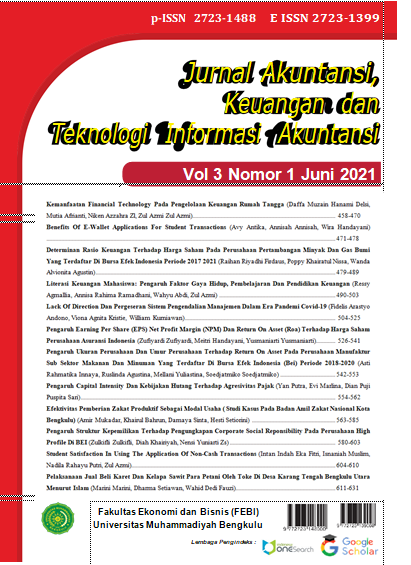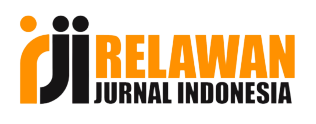LACK OF DIRECTION DAN PERGESERAN SISTEM PENGENDALIAN MANAJEMEN DALAM ERA PANDEMI COVID-19
DOI:
https://doi.org/10.36085/jakta.v3i1.3624Abstract
The purpose of this research is to deeply investigate the phenomenon of control problems changes during the pandemic COVID-19 era of crisis that triggers the changes in the organisation’s management control system (MCS). The deep process of control problems changes and the undertaking of MCS in the operational areas of the family business company are the focus of this research. This study is designed as a qualitative case study research that were drawing the data from two family business companies in the culinary business to get the empirical data. The research findings show the fact that lack of directions have become more significant control problems during the crisis era. Based upon the two investigated cases, the crisis era has changed not only the business environment but the business process as well that have led to the changing in the working environment. New problems emerged as the response to the changing of the operational activities and the existing MCS dominated with centralised informal control mechanism could not address it well. These mechanisms could not provide clear guidance for the managers and employees in problem solving and decision making in more unpredicted situation during the crisis. Therefore, strengthening and updating the formal controls are imperative in addressing the changes during the crisis of pandemic COVID-19 eraReferences
Afthonidis, E. P. and Tsiotras, G. D. (2014) ‘Strategies for business excellence under an economic crisis’, TQM Journal, 26(6), pp. 610–624. doi: 10.1108/TQM-10-2012-0078.
Ashraf, J. and Uddin, S. (2015) ‘Military, “managers” and hegemonies of management accounting controls: A critical realist interpretation’, Management Accounting Research, 29, pp. 13–26. doi: 10.1016/j.mar.2015.07.002.
Becker, S. D. et al. (2016) ‘Budgeting in times of economic crisis’, Contemporary Accounting Research, 33(4), pp. 1489–1517.
Brignall, S. and Modell, S. (2000) ‘An institutional perspective on performance measurement and management in the “new public sector”’, Management Accounting Research, 11(3), pp. 281–306. doi: 10.1006/mare.2000.0136.
Bryman, A. and Bell, E. (2015) Business Research Methods. Edited by 4th. OXFORD University Press.
Burhan, F. A. (2020) Bisnis Anjlok akibat Pandemi Corona, UMKM Bisa Ubah Strategi Usaha.
Burns, J. and Scapens, R. W. (2000) ‘Conceptualizing management accounting change: An institutional framework’, Management Accounting Research, 11(1), pp. 3–25. doi: 10.1006/mare.1999.0119.
Chenhall, R. H. (2003) ‘Management control systems design within its organizational context: findings from contingency-based research and directions for the future’, Accounting, Organizations and Society, 28, pp. 127–168. doi: 10.1016/S0361-3682(01)00027-7.
Collier, P. M. (2001) ‘The power of accounting: A field study of local financial management in a police force’, Management Accounting Research, 12(4), pp. 465–486. doi: 10.1006/mare.2001.0157.
Corbin, J. M. and Strauss, A. L. (2008) Basics of qualitative research: techniques and procedures for developing grounded theory. Sage Publications, Inc.
Cowton, C. J. and Dopson, S. (2002) ‘Foucalt’s prison? Management control in an automotive distributor’, Management Accounting Research, 13(2), pp. 191–213. doi: 10.1006/mare.2001.0173.
Delfino, G. F. and van der Kolk, B. (2021) ‘Remote working, management control changes and employee responses during the COVID-19 crisis’, Accounting, Auditing and Accountability Journal, 34(6), pp. 1376–1387. doi: 10.1108/AAAJ-06-2020-4657.
Doornich, J. B., Kaarbøe, K. and Bourmistrov, A. (2019) ‘The tension between intention and attention: Dialectic changes in the coercive and enabling orientations of organizational rules’, Qualitative Research in Accounting and Management, 16(2), pp. 197–223. doi: 10.1108/QRAM-06-2017-0056.
Efferin, S. and Hartono, M. S. (2015) ‘Management control and leadership styles in family business: An Indonesian case study’, Journal of Accounting and Organizational Change, 11(1), pp. 130–159. doi: 10.1108/JAOC-08-2012-0074.
Ezizwita and Sukma, T. (2021) ‘Dampak Pandemi Covid-19 Terhadap Bisnis Kuliner dan Strategi Beradaptasi di Era New Normal’, Jurnal Ekonomi dan Bisnis Dharma Andalas, 23(1), pp. 51–63.
Hertati, L. and Safkaur, O. (2020) ‘Dampak Revolusi Industri 4.0 Era Covid-19 pada Sistem Informasi Akuntansi Terhadap Struktur Modal Perusahaan’, Jurnal Riset Akuntansi dan Keuangan, 8(3), pp. 503–518. doi: 10.17509/jrak.v8i3.23557.
Hou, H. (Cynthia) et al. (2021) ‘A study on office workplace modification during the COVID-19 pandemic in The Netherlands’, Journal of Corporate Real Estate, 23(3), pp. 186–202. doi: 10.1108/JCRE-10-2020-0051.
Lukka, K. (2007) ‘Management accounting change and stability: Loosely coupled rules and routines in action’, Management Accounting Research, 18(1), pp. 76–101. doi: 10.1016/j.mar.2006.06.006.
Merchant, K. A. and Van der Stede, W. A. (2007) Management Control Systems: Performance Measurement, Evaluation and Incentives. 2nd editio. Essex: Pearson Education Limited.
Merchant, K. A. and Van der Stede, W. A. (2017) Management control systems - Performance Measurement, Evaluation and Incentives. fourth edi, Pearson Education Limited. fourth edi.
O’Connor, N. G., Vera-Muñoz, S. C. and Chan, F. (2011) ‘Competitive forces and the importance of management control systems in emerging-economy firms: The moderating effect of international market orientation’, Accounting, Organizations and Society, 36(4–5), pp. 246–266. doi: 10.1016/j.aos.2011.04.004.
Ouchi, W. G. (1979) ‘A Conceptual Framework for the Design of Organizational Control Mechanisms’, Management Science, 25(9), pp. 833–848. doi: 10.1287/mnsc.25.9.833.
Passetti, E. E. et al. (2021) ‘Coping with the COVID-19 pandemic: the technical, moral and facilitating role of management control’, Accounting, Auditing and Accountability Journal, 34(6), pp. 1430–1444. doi: 10.1108/AAAJ-08-2020-4839.
Rikhardsson, P. et al. (2021) ‘Management controls and crisis: evidence from the banking sector’, Accounting, Auditing and Accountability Journal, 34(4), pp. 757–785. doi: 10.1108/AAAJ-01-2020-4400.
Safkaur, O. (2021) ‘Pengaruh pengendalian biaya, fungsi penjualan terhadap peningkatan laba perusahaan bisnis era COVID-19’, Jurnal Riset Akuntansi dan Keuangan, 9(3), pp. 535–552. doi: 10.17509/jrak.v9i3.37283.
Santia, T. (2020) Industri makanan dan minuman paling terdampak virus corona, Liputan 6.
Sargiacomo, M., Ianni, L. and Everett, J. (2014) ‘Accounting for suffering: Calculative practices in the field of disaster relief’, Critical Perspectives on Accounting, 25(7), pp. 652–669. doi: 10.1016/j.cpa.2014.03.011.
Septiningrum, L. D. (2021) ‘Manajemen Strategi Untuk Meningkatkan Penjualan Food and Beverage Di Era Pandemi Covid 19’, JMBI UNSRAT (Jurnal Ilmiah Manajemen Bisnis dan Inovasi Universitas Sam Ratulangi)., 8(1), pp. 32–49. doi: 10.35794/jmbi.v8i1.32638.
Sheaff, R. et al. (2019) ‘Repositioning the boundaries between public and private healthcare providers in the English NHS’, Journal of Health Organization and Management, 33(7–8), pp. 776–790. doi: 10.1108/JHOM-12-2018-0355.
Yin, R. K. (2003) Case Study Research: Design and Methods. 3rd editio. California: Sage Publications Ltd.



















